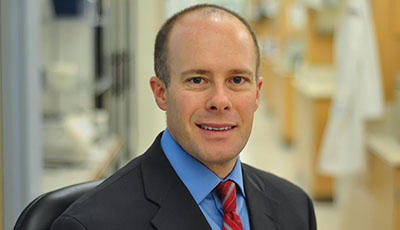MMI Receives a Two-year Grant from NIH to Explore How Children with Cerebral Palsy Perceive Pain
June 24, 2019

|
Max Kurz, Ph.D., an associate professor of physical therapy at the Munroe-Meyer Institute, received a two-year grant for more than $400,000 from the National Institutes of Health to explore how children with cerebral palsy perceive pain.
The grant from the Eunice Kennedy Shriver National Institute of Child Health and Human Development, which Dr. Kurz described as a "high-risk, high-reward" grant, will let him and his collaborators examine how the brains of children with cerebral palsy process sensory information.
"In the clinic, it's often reported that the children have pain, but the actual source of this pain is really not known," Dr. Kurz said. "When you don't know what the source is, it's difficult to treat."
Working with UNMC's Tony Wilson, Ph.D., director of the Magnetoencephalography Center, Dr. Kurz found that the areas of the brain that process sensations on the feet and hands are uncharacteristic in children with cerebral palsy.
"Our hypothesis is that since the activity for processing normal sensations is uncharacteristic, they are also uncharacteristic for processing pain, since the same areas of the brain that process a touch felt on the hand also process sensations of pain on the hand," Dr. Kurz said.
Drs. Kurz and Wilson, both recipients of UNMC's Distinguished Scientist research honor, will be collaborating with Jessica Goeller, D.O., of the UNMC Department of Anesthesiology, who is a leading expert on pain in children.
If the initial research shows a connection between sensory processing and pain perceptions, Dr. Kurz and his research team hope to target the affected areas with new therapeutic approaches that are directed at recalibrating how the brain processes pain.
But that effort is still ahead, Dr. Kurz said.
"We're in the first stage -- we want to see if there is a connection between the brain areas that process pain and a child's report of the pain they experience in their daily living," Dr. Kurz said. "Our preliminary data has shown that there is likely a strong connection between our brain measures and how pain affects a child's ability to concentrate at school, sleep and interact with their family and friends. For this grant we're going to evaluate if these initial outcomes hold in a larger cohort of children with cerebral palsy.
"If it works out that there is this connection, it could be rewarding, because then we could go after it therapeutically and try to recalibrate how the brain processes pain," he said. "It also would give us a more noninvasive way to assess pain without creating pain in an individual, and it would give us a data-driven approach for assessing pain."
Sidebar: No pain
Dr. Kurz emphasized that the research would not involve inducing pain in his study participants.
"We're looking at sensory processing and how it's connected to your cognitive perception of how much pain you have in your daily living," he said. "The actual stimulations I'll use are not painful, but they are activating the same brain areas that process both touch and pain information."







